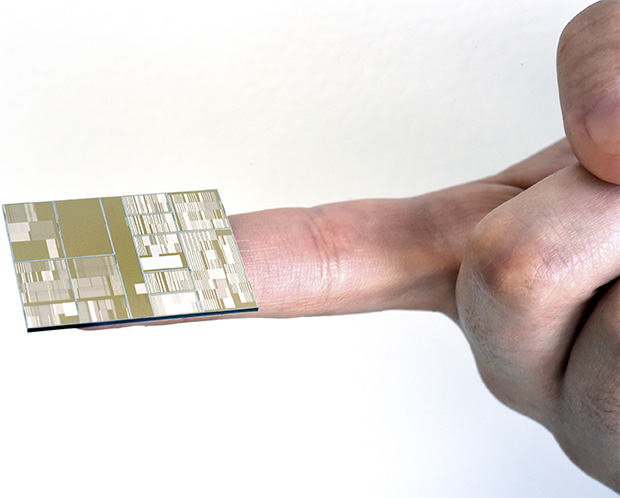IBM Leapfrogs Competing Chipmakers With World’s First 7nm Chip
IBM Research on Thursday announced that it has produced the semiconductor industry's first 7-nanometer node test chips with functioning transistors. The accomplishment was a joint effort with partners GlobalFoundries, Samsung, and SUNY Polytechnic Institute's Colleges of Nanoscale Science and Engineering.
It's also an important milestone in IBM's $3 billion research initiative announced last year. The initiative is a five-year plan that calls for IBM to heavily invest in a pair of broad research and early stage development programs to push the limits of chip technology. Getting to 7nm was one of the goals, though it doesn't stop there -- IBM is also looking beyond, which will require new materials rather than silicon.
As for the 7nm test chips announced today, the researchers involved had to bypass conventional semiconductor manufacturing approaches with a number of industry-first innovations. Chief among them was the decision to use a silicon germanium (SiGe) alloy rather than just silicon, along with extreme ultraviolet (EUV) lithography. This combination allowed IBM and the team the shrink the surface area of chip by nearly 50 percent compared to today's 10nm manufacturing processes.

The 7nm chips are about the size of a fingernail. Looking ahead, IBM sees these 7nm chips being packed up with more than 20 billion transistors and powering a wide range of devices, everything from smartphones to spacecraft.
"For business and society to get the most out of tomorrow's computers and devices, scaling to 7nm and beyond is essential," said Arvind Krishna, senior vice president and director of IBM Research. "That's why IBM has remained committed to an aggressive basic research agenda that continually pushes the limits of semiconductor technology. Working with our partners, this milestone builds on decades of research that has set the pace for the microelectronics industry, and positions us to advance our leadership for years to come."
It will be some time before we see commercially available microprocessors using a 7nm manufacturing process. The biggest semiconductor players are currently churning out 14nm parts, like Intel's Broadwell and upcoming Skylake CPUs, and there are still some hiccups to be ironed at 10nm. Should everything go smoothly, we could see processors built on a 7nm manufacturing process emerge by the end of the decade.
It's also an important milestone in IBM's $3 billion research initiative announced last year. The initiative is a five-year plan that calls for IBM to heavily invest in a pair of broad research and early stage development programs to push the limits of chip technology. Getting to 7nm was one of the goals, though it doesn't stop there -- IBM is also looking beyond, which will require new materials rather than silicon.
As for the 7nm test chips announced today, the researchers involved had to bypass conventional semiconductor manufacturing approaches with a number of industry-first innovations. Chief among them was the decision to use a silicon germanium (SiGe) alloy rather than just silicon, along with extreme ultraviolet (EUV) lithography. This combination allowed IBM and the team the shrink the surface area of chip by nearly 50 percent compared to today's 10nm manufacturing processes.

The 7nm chips are about the size of a fingernail. Looking ahead, IBM sees these 7nm chips being packed up with more than 20 billion transistors and powering a wide range of devices, everything from smartphones to spacecraft.
"For business and society to get the most out of tomorrow's computers and devices, scaling to 7nm and beyond is essential," said Arvind Krishna, senior vice president and director of IBM Research. "That's why IBM has remained committed to an aggressive basic research agenda that continually pushes the limits of semiconductor technology. Working with our partners, this milestone builds on decades of research that has set the pace for the microelectronics industry, and positions us to advance our leadership for years to come."
It will be some time before we see commercially available microprocessors using a 7nm manufacturing process. The biggest semiconductor players are currently churning out 14nm parts, like Intel's Broadwell and upcoming Skylake CPUs, and there are still some hiccups to be ironed at 10nm. Should everything go smoothly, we could see processors built on a 7nm manufacturing process emerge by the end of the decade.

